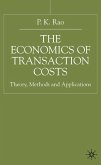According to the assumptions of classical economics, the price should be set at the intersection of the supply and demand curve under the assumption of full information and rationality of market participants. However, in health care pricing is often regulated and price is set by the regulatory body. Due to the fact that the regulations in terms of pricing include activities that lead to price-setting of a good (health service), costs associated with these activities should be treated as transaction costs.
The study is the result of the research on the transaction costs of the pricing of health services. The primary objective of the study is to identify the transaction costs occurring during the pricing of health services and characterize the factors that affect the level of transaction costs. An additional objective of this study is to link the conclusions about the level of transaction costs to the conclusions regarding the accuracy of the cost-based pricing in health care.
The empirical part of the work was carried out based on the analysis of primary and secondary sources. Its aim was to present how pricing is organized in seventeen countries selected.
The study is the result of the research on the transaction costs of the pricing of health services. The primary objective of the study is to identify the transaction costs occurring during the pricing of health services and characterize the factors that affect the level of transaction costs. An additional objective of this study is to link the conclusions about the level of transaction costs to the conclusions regarding the accuracy of the cost-based pricing in health care.
The empirical part of the work was carried out based on the analysis of primary and secondary sources. Its aim was to present how pricing is organized in seventeen countries selected.








